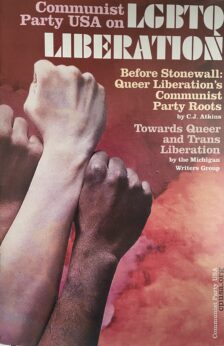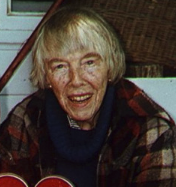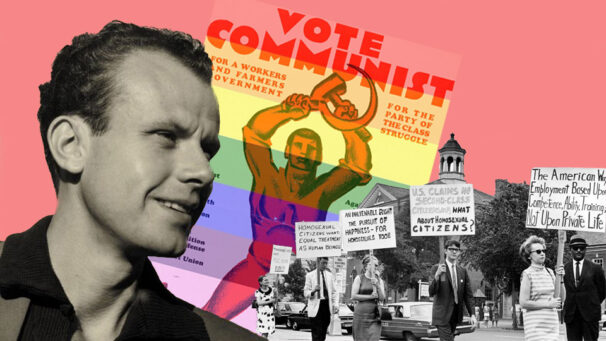
“The demonization of transgender people in the United States,” the Communist Party USA statement posted on Jan. 4 opens, “is today a focal point of the far right’s campaign for political and economic domination. Capitalism in the United States has always thrived on the division of working people in our country. At various times in history, the ruling class has promoted the oppression of people of color, immigrants, women, and LGBTQ people. Now, the trans community is in the crosshairs and needs support and solidarity.”
Though the Communist Party in recent years has made ample amends for its belated embrace of the LGBTQ community and its struggles, the power of the new statement on trans issues, in particular, is stunningly historic.
The resolution was introduced and passed by the CPUSA National Board. With publication on the party’s website, it has now been formally submitted for party-wide and broader public discussion.
How did the statement come about?

For more than a decade, the CPUSA has been a declared ally in the fight for LGBTQ equality. Many openly queer persons have developed politically and organizationally to take on leading roles in the party, locally and nationally, and in the party press, including People’s World.
The “T” in LGBTQ was casually assumed to be covered under the umbrella commitment, but the party had not fully grappled with the unique challenges and oppression of the trans community. This became obvious when some trans comrades raised concerns about inadequate attentiveness to trans issues in the party’s work. Some of this new attention arose over the summer of 2021, when over a third of the more than 110 applicants to the Young Communist League (YCL) summer school in New York City self-identified as non-binary or as a member of the LGBTQ community.
Alerted to such clear trends in the nation as a whole, and within the party, the National Board of the party convened a subcommittee to take an internal look at where the party might be lacking when it came to understanding the trans equality struggle and to find concrete ways for the membership to get involved.
The National Board subcommittee also examined the status of the trans community on the polarized political playing field of today. First and foremost was the cynical attack on transgender Americans by the GOP for the purpose of mobilizing its voter base in the last few election cycles. It became clear that the Communist Party needed to make an unequivocal statement of support for this section of our working class and people.
The subcommittee also took note of the influx of young trans persons into the party ranks in the recent period, one aspect of the significant growth the party has recorded. Trans people, no less than others, were seeking a home in the party for radical social transformation that embraced both their own demands and the larger challenges of the working class, climate change, militarism, racism, gender equality—in short, the entire worldview of the Communist movement.
An internal and external educational component also figures into the historical equation: The CP had not done an adequate job of educating its members about the fight of trans Americans not just for equality, but even to exist. Though most party members and leaders were supportive of trans equality in the abstract, not everyone knew how that really translated into practical work.
Part of the educational aspect behind the statement involves getting people in the CP orbit, and in society generally, to adopt proper pronoun usage; to fight against reactionary wedge maneuvers like bathroom bans, censorship of teachers and counselors trying to introduce age-appropriate information in schools, and banning the updating of identification forms; to protest and punish physical violence against trans people; and to affirm the right of all human beings to gender-affirming health care without religious or other social prejudice.
As the statement gets read and discussed throughout the party, it invites self-reflection and self-correction at a time both of rapid organizational growth and when trans and related issues are being hotly debated in legislatures and courts at every level. Such evolution of consciousness is something necessary and welcome.
“Following the defeat of Trump in the 2020 elections and the blows dealt to the fascist-leaning faction of the Republican Party,” the statement says, “the extreme right stepped up its efforts to reclaim the offensive against the forces of progress.
“It has added a sustained nationwide transphobic assault to the racism, male supremacy, misogyny, and LGBTQ-phobia that have long been favored weapons of the forces of big-business politics.
“The year 2021 saw a record number of anti-trans legislative proposals put forward by Republicans and Evangelical Christian legislators across the country. No fewer than 110 bills in at least 37 states were filed. From Hawaii to Florida, Texas to Maine, Republicans went on a full-court press to target trans people—especially trans female student athletes.”
The subcommittee convened by the National Board included both long-term and newer party members with experience in the LGBTQ struggle. The voices of trans party members were a part of the conversation at every stage of analyzing the objective conditions in the nation and the party’s work to date.
“In the immediate term, members of the Communist Party are committed to winning the Equality Act, which, if it can be passed over Republican filibuster threats, would amend the 1964 Civil Rights Act to forbid discrimination on the basis of sex, sexual orientation, and gender identity. Making the Equality Act law would provide protections for transgender Americans—and everyone else—against prejudice in employment, housing, education, and many other areas of life.”
Other recent developments
Attention on the shifting, erratic history of the CPUSA and the LGBTQ movements over time has lately increased. Last June, People’s World Managing Editor C.J. Atkins published an appreciation of Harry Hay, one of the founders of the modern gay rights movement, teasing out his long membership in the CPUSA and his Marxist understanding of the oppressed condition of gay people in the U.S. That article was subsequently included, along with “Toward Queer and Trans Liberation,” by the Michigan Writers Group, in a separate CP pamphlet designed, no doubt, as a promotional piece to interest readers in the party’s views and in potential membership.

Other signs of recent increased interest in the topic include Elisabeth Armstrong’s article in Faith in the Masses: Essays Celebrating 100 Years of the Communist Party, USA (International Publishers, 2020), entitled, “Gita, Betty, and the Women’s International Democratic Federation: An Internationalist Love Story,” highlighting a special friendship (though likely not a physical one) that lasted many years between two Communist women, Betty Millard from the U.S., and Gita Bannerji from India. In addition, historian Aaron S. Lecklider has recently written the monumental Love’s Next Meeting: The Forgotten History of Homosexuality and the Left in American Culture, published by the University of California Press. And in preparation now is also a monograph by Bettina Aptheker on 20th-century LGBTQ party activists. Other students of gender and socialism are diving into the extensive Betty Millard archive that she placed in the Smith College Library.
Some deeper historical background
The CPUSA was born in 1919 in the wake of the Russian Revolution, which likewise inspired the formation of Communist parties in scores of countries around the world. Famously, among the early achievements of the Revolution, and as an example to the world, the Soviets abolished all the Tsarist-era laws against homosexuality; abortion was legalized; women were encouraged to enter the workforce in roles equal to those of men; and gender equality was declared, at least formally, the law of the land.
Homosexual and nonconforming people all over the globe looked to the Communist movement for liberation. The 1920s flourished, within the USSR and abroad, with an outpouring of solidarity between sexual rebels and the Communist ideal.
All this came to a screeching halt in the 1930s with the consolidation of power under Joseph Stalin. For one thing, the USSR now once again forbade abortion, as projections indicated that the workforce for the building of socialism was becoming severely imperiled with women not producing enough babies. And the old laws criminalizing homosexuality were brought back. Suppressed and forgotten were those early revolutionary reforms that made communism a beacon for those who thought and acted outside the binary, patriarchal scheme.

Yet there were those—such as Harry Hay, Betty Millard, and others less well-known—who chose to believe it was not the end of the road for that earlier sympathy of ideas to return. Both within the party, and most certainly from without, and increasingly so as the modern LGBTQ liberation movement gathered steam, critics demanded that the CPUSA reexamine its Soviet-inspired hostility toward the demands of the new sexual militants—that, tellingly, also echoed the sexual repressiveness at home. For years, the party clung to the safe ground of placing the interests of the “working class” first and not lifting sexuality into any higher priority. It also raised fears of blackmail, gossip and government pressure on psychiatrists, for example, as barriers to full acceptance.
Some critics speculated that it wasn’t so much the open contempt for gay people that drove the party’s intransigence, but more the fear of offending its Soviet partners and showing them, by contrast, to be, on this topic, backward and against the modern grain. Gus Hall, party leader at the time, undoubtedly played a part in failing to engage this question. Yet despite internal justifications that the party was benign and never actually went out of its way to harm gay people, what were people to think when time after time the New York City Council considered resolutions to affirm non-discrimination and the party (with its largest membership in NYC) kept silent? Or when a grand multi-cultural arts festival celebrated the 1990 investiture of NYC’s first Black Mayor, David Dinkins—two decades after Stonewall and long after the cowardly murder of San Francisco Supervisor Harvey Milk—and of all the participating artists and ensembles, the only voices left out of the party press coverage were pointedly those of the 150-strong New York City Gay Men’s Chorus?

Many other political parties and formations on the left had already long endorsed the new feminist and LGBTQ movements and their demands. The CPUSA was the last big holdout—with only the minor exception of some tiny groupuscules maintaining the dogma that homosexuality was a sign of capitalist degeneracy, revealing a promise of what was to come should such severely warped, anti-humanistic tendencies ever rise to political power.
So it is against this background and the historic, though belated shift toward the party’s full affirmation of LGBTQ rights and demands in the 21st century that we must view the latest statement. While it looks forward and presents its conclusions in, still, a working-class framework as it ultimately regards almost all issues, there is no space here to review the entire arc of this delicately nuanced history. That would be the job of a new generation of researchers and historians.
Pioneers like Betty Millard and Harry Hay showed the example of what it meant to be a queer Communist in action, even if the party wasn’t ready for it in their lifetimes. Yet certain activists all along, in the 1980s and ’90s, kept reminding the CPUSA that “an injury to one is an injury to all.”
“Winning the long-term goal of socialism requires the unity of all workers and oppressed peoples —and that includes trans people,” the statement declares. “Our party will never be silent in the face of attacks on the trans community, no matter what forces or interests initiate them.
“The Communist Party resolves to throw itself fully into the fight for trans people’s right to exist, to gender self-determination and gender-affirming health care, to be recognized as who they are, to live free of discrimination with full and equal civil rights, and to thrive—on the job, in school, at home, and in all spaces and places.”
The full statement can be read here.
C.J. Atkins and Maicol David Lynch graciously contributed to this article.










